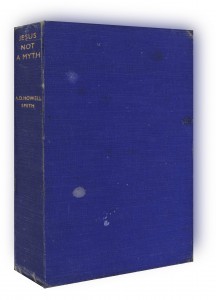At about 57 mins of the MythVision podcast O’Neill underscores the importance of Paul’s claim to have met James the “brother of the Lord”. Not only is Paul’s claim from a contemporary of Jesus but it is even from one who is opposed to his source: Paul is saying, says O’Neill, “Yeh, I have met the brother of Jesus and he’s a dick.” Now evidence from contemporaries, especially contemporary adversaries, is certainly strong evidence for historicity, but at this point, O’Neill tosses aside and out of sight the most fundamental principle he said was the basis of all good historical inquiry: a need to acknowledge ambiguity in the evidence. O’Neill’s first task, therefore, is to characterize any interpretation that allows for ambiguity to be outright nonsense.
Basic historical methods applied to Paul meeting “the brother of the Lord”

Yet there is an even more fundamental rule for any historian examining sources that O’Neill never mentions: study the context of the source and the information in it! It’s this simple:
- Acknowledge the fact that that “met James the brother of the Lord” phrase is unknown to Church Fathers who would dearly have loved to have known it to win their theological debates against “heretics” (– I was first informed of this fact by an honest author who was arguing against the Christ myth theory);
- Stop and think how bizarre it is that there are no other early Christian accounts that record that one of the leaders of the Christian church at Jerusalem was the very brother of Jesus! Is it really plausible that this one passing reference in a letter of Paul, a letter that was the focus of so much controversy in the early church, should be the only evidence we have from the early days of the church that Jesus’ brother became the new leader alongside Peter? Not even the Book of Acts, which portrays James as a noble head of the Jerusalem church, leads anyone to suspect that that James was a brother of Jesus.
For further details discussing the above context of this passage see
- James Brother of the Lord: Another Case for Interpolation
- Thinking through the “James, the brother of the Lord” passage in Galatians 1:19
O’Neill emphasizes that a historian must be open to ambiguity when studying the sources. Indeed. There are reasonable grounds for suspecting that the passage in which Paul says he met the “brother of the Lord” was added some time in the second century in order to better assist “orthodox” Christians argue against their theological opponents. Further, fundamental questions arise when we try to understand how a brother of Jesus could have become the church’s leader without any other contemporary or near contemporary indication that anyone knew about it.
It is “bad history” to take a passage as testimony to a “historical fact” without first testing the authenticity of that evidence.
Basic historical method guards against circular reasoning

O’Neill next engages in a very common failing of many historical Jesus scholars: circular reasoning. That failing is not unique to biblical scholars, though, since it is one of the fallacies pointed out in a famous book from 1970 by historian David Hackett Fischer, Historians’ Fallacies: Toward a Logic of Historical Thought.
The fallacy of the circular proof is a species of a question-begging, which consists in assuming what is to be proved. A hypothetical example might help to clarify the point. A researcher asks, “Do gentlemen prefer blondes?” He discovers that Smith, Jones, and James prefer blondes, and tacitly assumes that Smith, Jones, and James are therefore gentlemen. He concludes that three gentlemen out of three prefer blondes, and that the question is empirically established, with a perfect correlation. His argument runs through the following stages :
Inquiry : Do gentlemen prefer blondes?
Research : Smith, Jones, and James prefer blondes.
(Tacit Assumption ) : Smith, Jones, and James are gentlemen.
Conclusion: Therefore, gentlemen prefer blondes.Absurd as this fallacy may appear in a hypothetical way, it is exceedingly common in empirical scholarship.
(Fischer, 49)
petitio principii : a fallacy in which a conclusion is taken for granted in the premises; begging the question.
Dietary laws
One of several examples of this fallacy that O’Neill offers (paraphrasing):
In the Gospel of Mark we read that Jesus addresses the Jewish dietary laws. This makes sense if there was a historical Jesus who was saying those things about the dietary laws that the church (at the time the gospel was written) no longer followed. It doesn’t make a lot of sense if Jesus didn’t exist.
O’Neill here is uncritically repeating an argument found among some mainstream biblical scholars. It makes just as much sense on the assumption that the Jesus of the gospels was a literary figure created to express the view of the church.
Clark Kent to Superman

At this point the host, Derek Lambert, interjects with another piece of circularity common among too many mainstream biblical scholars (again, my paraphrase):
In the Gospel of Mark Jesus appears like a Clark Kent but by the time of the Gospel of John he is Superman. The evidence is so easily explained if there was an original guy who wanted the temple brought down, and then that happened, but because it didn’t get rebuilt, the Christians had to change the prophecy of Jesus into one where he claimed to be speaking about the temple of his body.
Yes, if we assume that there was a historical Jesus at the start, then we can indeed say that the subsequent evidence can be explained by that same historical Jesus. That’s circularity. The same logic can be used to say that if we assume that the gospel authors portrayed a Jesus who fitted the time of those writers, then we can explain the later changes to the gospels as the result of adapting to changing circumstances and beliefs. Question begging works any way you want to use it.
Besides, O’Neill ought to have picked Derek Lambert up on his factual error (another one common among many biblical scholars) that the Gospel of Mark portrays a relatively ungodly “merely human” Jesus. A man who walks on water and commands the storms to cease just like the Yahweh in the Psalms is not a “merely human” figure. Nor is the range of emotion imputed to Mark’s Jesus “merely human”: anger, for instance, is a very common godly emotion. For further details see
From Nazareth or Bethlehem?
Another very common instance of circularity appears in discussions about the birth narratives. The assumption is that there was a historical Jesus who was born in Nazareth, and since everyone supposedly knew he came from this tiny village “no-one had ever heard of”, the gospel authors tied themselves in knots trying to explain how he was really born, according to the messianic prophecy, in Bethlehem.
About the 1 hour and 10 minute mark O’Neill says, quite rightly, that later (noncanonical) gospels sometimes harmonize the earlier gospels. Matthew and Luke offer contradictory, even incompatible, nativity stories. This makes sense, he rightly says, if we assume that the authors were each independently struggling to work out their own narrative to explain how Jesus came to be known to be “from Nazareth” even though he was born in Bethlehem. I say “rightly” because yes, it does make sense if we assume the premise we are trying to prove is true from the outset.
It makes just as much sense to say that the authors of both Matthew and Luke were trying to establish a legend that Jesus was born at Bethlehem (according to the messianic prophecy) while at the same time attempting to remove an embarrassing epithet by which the earliest sects of Jesus worship were known, the “nazoreans” or “nazarenes”. (The Arab and Muslim world still today refer to Christians by a cognate of that same term.) The Gospel of Matthew at 2:23 bizarrely twists a scripture and grammatical Greek to make it give that title a new meaning.
Thus the evidence of Matthew is that the early evangelists were struggling with a title they no longer felt comfortable with and decided to hide its original meaning by re-interpreting it as meaning “from Nazareth”. Luke most likely re-wrote Matthew to give a better narrative account.
By setting aside the fallacy of assuming a historical Jesus at the outset we open ourselves to a much richer scenario in accordance with all of the evidence.
Nazareth did not exist — “a stupid idea”?

At about 1 hour and 16 minutes O’Neill says it is “a stupid idea that Nazareth did not exist”, and, “no archaeologist accepts that”, and even more, “I wrote an entire article on that!” Later O’Neill explained that his articles are about 10,000 words long so they are very “in-depth”. There is just one problem: O’Neill goes out of his way to personally humiliate Rene Salm for, while being an amateur, daring to investigate the scholarly literature on the archaeological finds at Nazareth and finding that they do not support the traditional Christian viewpoint. Personally ridiculing and demeaning another person is “bad history” by anyone’s definition, surely. (O’Neill later excuses his harsh language by saying he only attacks those who attack him first. That is simply untrue, as his attacks on Salm clearly demonstrate.)
O’Neill did write a lot of words attempting to demonstrate that Salm had mistranslated and misapplied the work of the archaeologist Hans-Peter Kuhnen, but he got everything about Salm’s treatment of Kuhnen — and Kuhnen’s actual views — flat wrong. O’Neill was clearly unaware that Kuhnen had personally corresponded with Salm and had enough respect for Salm’s views introduce it in his teaching:
– “Insgesamt finde ich, wie gesagt , Ihre überlegungen sehr interessant, und habe darüber auch schon den Studenten in meinem derzeitigen Seminar an der Uni Mainz berichtet. Im nächsten Semester möchte ich an der Uni Mainz ein kritisches Seminar zum Thema “Archäologie und Neues Testament” anbieten. Dabei werden wir sicher auch Ihr Buch behandeln.”
(Translation: “In all, I find your reflections very interesting, as mentioned above. I have already communicated your views to students in my current Seminar at the Univ. of Mainz. Next summer I would like to offer a critical seminar on the Archaeology of the New Testament. In it we will certainly discuss your book.”
(Kuhnen correspondence to Salm, May 2009.)
For those interested in further discussion of Tim’s errors and Kuhnen’s correspondence with Salm, see
- Tim O’Neill Misreads (Again) the Evidence on Nazareth
- Salm’s Nazareth Correspondence with Kuhnen Demonstrates O’Neill’s Falsehoods
Why does O’Neill go to such lengths to publicly humiliate Salm and to write falsehoods about his argument? I think the reason must be the same as that found in conservative scholars who have similarly treated “minimalists”. Niels Peter Lemche explains:
There are several kinds of name-calling, but in the end, they all tend to impress a readership in such a way that it will simply abstain from reading material written by members of the group characterized by the name-calling. . . .
What is the aim of this labeling? Here it is interesting to compare with the characterization of conservative scholarship in James Barr‘s book on fundamentalism where Barr in his own acid way reviews the tactics of conservative scholarship. We may summarize Barr’s argument in this way: The advice to the novice in biblical studies is never engage in any serious way in a discussion with non-conservative scholars. You should just denounce them as incompetent and not worth reading and continue this tactic until people believe you.
For original citation references see The Tactics of Conservative Scholarship (according to J. Barr & N-P. Lemche)
More misreading of “Fake Facts” from the sources
O’Neill brushes aside all scholarship by respected mainstream biblical academics who question Bart Ehrman’s view that all sources depict “the historical/earliest Jesus” as an “apocalyptic prophet” by declaring that the apocalyptic interpretation is, in effect, the standard one today.
He even introduces Paul to verify this claim by saying that even Paul depicted Jesus as an apocalyptic prophet. That, of course, is a careless fabrication. Paul himself preached the coming end of the age, but he would have a difficult time trying to find Paul depicting Jesus as a wandering prophet preaching the same.
Again, we find another instance of circularity here. Yes, if one lines up all the texts “in order of composition” we find that in the earliest texts Jesus is an apocalyptic prophet and less so as time goes by. (Forget for a moment the question of whether we are deciding what texts are earlier by assuming that the earliest ones depict Jesus as such a prophet.)
All that sort of evidence demonstrates is that the earliest writings appeared in a context of imminent expectation of a heavenly Jesus, especially in relation to the fall of the temple. It is fallacious to begin with the assumption that a historical Jesus was behind it all. That point has yet to be proven.
O’Neill further mentions in passing that if Jesus was a myth then he should have been born in Bethlehem from the outset (no Nazareth) and he should not have been crucified. Again, these claims are all products of circularity, of question-begging. As we have posted many times on this blog, there is an overwhelming abundance of literature about the Second Temple era that would encourage Jews to conceptualize a messianic figure who, like Isaac, like the fleeing David on the Mount of Olives, like Isaiah’s Suffering Servant, like Daniel and Daniel’s vision of the Son of Man, like the Maccabean martyrs, a messianic figure must necessarily conquer all evil in the cosmos by suffering, dying and rising again to power and glory.
One more post to come…
Fischer, David Hackett. 1970. Historians’ Fallacies: Toward a Logic of Historical Thought. New York: Harper.
Lambert, Derek. 2020. The Problems With Jesus Mythicism – Tim O’Neill. Youtube Video. https://www.youtube.com/watch?v=TkZTiLacoks&feature=youtu.be.
If you enjoyed this post, please consider donating to Vridar. Thanks!

Question – why believe anything Paul (or his later compilers & editors) said when there is zero contemporary evidence? I don’t believe Joe Smith’s claims. I don’t believe L. Ron Hubbard’s claims. I don’t believe Sun Yung Moon’s claims. I don’t believe Jim Jones, David Koresh, the Applewhites, etc so why believe Paul?
why believe Paul?
Historicists weirdly respond:
“There are all kinds of references in Paul to what happened before he came along.”
Yes, historicists often talk like fundies.
Even assuming that Paul’s account of the Christian movement’s existing before him are true (which itself should be justified, I think; cf., Yogi Bhajan, who successfully made up what he claimed was ancient Sikh wisdom from India in the USA because his followers were ignorant of Indian Sikhism beyond what he told them), why should Paul not be regarded as being a figure like the confidence tricksters who hijacked portions of the Moorish Science Temple in order to found Nation of Islam?
Another excellent post. The Nazareth/Nazorean issue and perfectly logical explanation was one that I struggled with and it even had Hitchens stumped, or he never seriously considered looking at the etymology.
O’Neill’s treatment of Salm has been utterly disgraceful. (not that he has treated you with oodles of kindness either, of course).
Your forebearance has been admirable, I must admit.
The irony is, that O’Neill treats with utter disdain, those that he deems as unqualified to comment. He has no grounds for such, since he is an amateur himself, albeit one with a mediocre qualification in an allied subject. Still, an amateur he is, all the same.
An argument should stand or fall on it’s own merits.
Coupled with the fact that he is an amateur himself, and he demonstrates at a regularity his amateurish abilities, he’s got no grounds to be slating anyone.
Folk in glass houses should not be chucking stones.